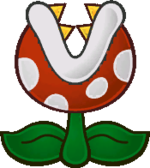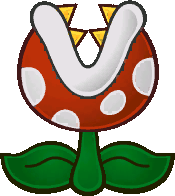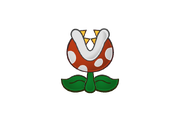Piranha Plant (Pit of 100 Trials): Difference between revisions
No edit summary |
Tag: Mobile edit |
||
| (20 intermediate revisions by 11 users not shown) | |||
| Line 1: | Line 1: | ||
{{ | {{species infobox | ||
'''Piranha Plants''' are enemies found in ''[[Paper Mario: The Thousand-Year Door]]''. They are the strongest of all [[Piranha Plant]]s and like to live in [[Warp Pipe|pipes]], as indicated in the Tattle Log, despite the fact that no Piranha Plants in | |image=[[File:Piranha Plant PMTTYD.png|150px]]<br>Sprite from ''Paper Mario: The Thousand-Year Door'' | ||
|first_appearance=''[[Paper Mario: The Thousand-Year Door]]'' ([[List of games by date#2004|2004]]) | |||
|latest_appearance=''[[Paper Mario: The Thousand-Year Door (Nintendo Switch)|Paper Mario: The Thousand-Year Door]]'' ([[Nintendo Switch]]) ([[List of games by date#2024|2024]]) | |||
|variant_of=[[Piranha Plant]] | |||
}} | |||
'''Piranha Plants''' are enemies found in ''[[Paper Mario: The Thousand-Year Door]]''. They are the strongest of all [[Piranha Plant]]s and like to live in [[Warp Pipe|pipes]], as indicated in the Tattle Log, despite the fact that no Piranha Plants in this game appear in pipes (though this more likely references the regular Piranha Plants from the [[Super Mario (series)|''Super Mario'' series]]). | |||
==History== | |||
===''Paper Mario: The Thousand-Year Door''=== | |||
Piranha Plants have the second-highest statistical attack power in the game, exceeded only by an [[Amazy Dayzee]], which is 20. They also have absurdly high [[Heart Point|HP]], only being beaten out by a handful of non-bosses, such as [[Dark Craw]]s and [[Dark Koopatrol]]s. Despite their toughness, they are easily put to sleep, incapacitating them for a few turns. They also have a good chance to be confused, possibly making them attack other enemies with massive strength. | |||
Piranha Plants are rare in ''Paper Mario: The Thousand-Year Door'', found only in the [[Pit of 100 Trials (Paper Mario: The Thousand-Year Door)|Pit of 100 Trials]] in floors 81-89. | Piranha Plants are rare in ''Paper Mario: The Thousand-Year Door'', found only in the [[Pit of 100 Trials (Paper Mario: The Thousand-Year Door)|Pit of 100 Trials]] in floors 81-89. | ||
In ''[[Super Smash Bros. Ultimate]]'', "''Killer | ===''Super Smash Bros. Ultimate''=== | ||
In ''[[Super Smash Bros. Ultimate]]'', "''Killer Packun''" is mentioned briefly by [[icaruspedia:Viridi|Viridi]] during the Japanese [[List of Palutena's Guidance conversations|Palutena's Guidance]] dialogue for [[Piranha Plant]]. It does not get a respective mention in the English dialogue, like [[Fire Nipper Plant]]. If the game is set to Simplified or Traditional Chinese or Korean (which use the Japanese voice set), the corresponding name for ''Killer Packun'' is referred to in English as simply "Piranha Plant". | |||
==Profiles and statistics== | |||
===''Paper Mario: The Thousand-Year Door''=== | |||
====GameCube==== | |||
{{:Paper Mario: The Thousand-Year Door bestiary|transcludesection=Piranha Plant|align=horizontal|image=[[File:Piranha Plant PMTTYD.png]]}} | |||
====Nintendo Switch==== | |||
{{:Paper Mario: The Thousand-Year Door (Nintendo Switch) bestiary|transcludesection=Piranha Plant|align=horizontal}} | |||
==Names in other languages== | ==Names in other languages== | ||
| Line 11: | Line 30: | ||
|JapR=Kirā Pakkun | |JapR=Kirā Pakkun | ||
|JapM=Killer Piranha | |JapM=Killer Piranha | ||
|ChiS=炮弹刺客吞食花 | |||
|ChiSR=Pàodàn Cìkè Tūnshí Huā | |||
|ChiSM=[[Bullet Bill#Names in other languages|Bullet Bill]] Piranha Plant | |||
|ChiT=炮彈刺客吞食花 | |||
|ChiTR=Pàodàn Cìkè Tūnshí Huā | |||
|ChiTM=[[Bullet Bill#Names in other languages|Bullet Bill]] Piranha Plant | |||
|Fre=Piranha Tueur | |||
|FreM=Killer Piranha | |||
|Ger=Killer-Piranha | |Ger=Killer-Piranha | ||
|GerM=Killer Piranha | |GerM=Killer Piranha | ||
| | |Ita=Pianta Piranha | ||
| | |ItaM=Piranha Plant (Same as [[Piranha Plant#Paper Mario: The Thousand-Year Door|Pale Piranha]]) | ||
|Kor=킬러뻐끔플라워 | |||
|KorR=Killeo Ppeokkeum Peullawo | |||
|KorM=Killer Piranha Plant | |||
|Spa=Planta Piraña | |||
|SpaM=Piranha Plant | |||
}} | }} | ||
==Trivia== | ==Trivia== | ||
*The respective internal file names for this Piranha Plant and [[Pale Piranha]]s (considered the "normal" Piranha Plants for this game in Japan) indicate that at some point in development, these Piranha Plants were intended to be the "base" version of Piranha Plant while the final game's Pale Piranha was intended as a variant of it, explaining the usage of the original coloration as well as the English localization calling them "Piranha Plants" but acknowledging them as different from the "usual" Piranha Plants.<ref>''c_pakflwr'' and ''c_pakflwr_t'', respective file names for Piranha Plants and Pale Piranhas in ''Paper Mario: The Thousand-Year Door''</ref> | *The respective internal file names for this Piranha Plant and [[Piranha Plant#Paper Mario: The Thousand-Year Door|Pale Piranha]]s (considered the "normal" Piranha Plants for this game in Japan) indicate that at some point in development, these Piranha Plants were intended to be the "base" version of Piranha Plant while the final game's Pale Piranha was intended as a variant of it, explaining the usage of the original coloration as well as the English localization calling them "Piranha Plants" but acknowledging them as different from the "usual" Piranha Plants.<ref>''c_pakflwr'' and ''c_pakflwr_t'', respective file names for Piranha Plants and Pale Piranhas in ''Paper Mario: The Thousand-Year Door''</ref> | ||
==References== | ==References== | ||
| Line 26: | Line 58: | ||
{{PMTTYD}} | {{PMTTYD}} | ||
[[Category:Piranha Plants]] | [[Category:Piranha Plants]] | ||
[[Category:Paper Mario: The Thousand-Year Door | [[Category:Paper Mario: The Thousand-Year Door enemies]] | ||
[[de:Killer-Piranha]] | [[de:Killer-Piranha]] | ||
Revision as of 06:30, July 18, 2024
| Piranha Plant | |
|---|---|
 Sprite from Paper Mario: The Thousand-Year Door | |
| First appearance | Paper Mario: The Thousand-Year Door (2004) |
| Latest appearance | Paper Mario: The Thousand-Year Door (Nintendo Switch) (2024) |
| Variant of | Piranha Plant |
Piranha Plants are enemies found in Paper Mario: The Thousand-Year Door. They are the strongest of all Piranha Plants and like to live in pipes, as indicated in the Tattle Log, despite the fact that no Piranha Plants in this game appear in pipes (though this more likely references the regular Piranha Plants from the Super Mario series).
History
Paper Mario: The Thousand-Year Door
Piranha Plants have the second-highest statistical attack power in the game, exceeded only by an Amazy Dayzee, which is 20. They also have absurdly high HP, only being beaten out by a handful of non-bosses, such as Dark Craws and Dark Koopatrols. Despite their toughness, they are easily put to sleep, incapacitating them for a few turns. They also have a good chance to be confused, possibly making them attack other enemies with massive strength.
Piranha Plants are rare in Paper Mario: The Thousand-Year Door, found only in the Pit of 100 Trials in floors 81-89.
Super Smash Bros. Ultimate
In Super Smash Bros. Ultimate, "Killer Packun" is mentioned briefly by Viridi during the Japanese Palutena's Guidance dialogue for Piranha Plant. It does not get a respective mention in the English dialogue, like Fire Nipper Plant. If the game is set to Simplified or Traditional Chinese or Korean (which use the Japanese voice set), the corresponding name for Killer Packun is referred to in English as simply "Piranha Plant".
Profiles and statistics
Paper Mario: The Thousand-Year Door
GameCube
| Paper Mario: The Thousand-Year Door enemy | ||||||||
|---|---|---|---|---|---|---|---|---|
| Piranha Plant | ||||||||

|
Max HP | 15 | Attack | 9 | Defense | 0 | ||
| Location(s) | Pit of 100 Trials (Levels 81, 83-86, 88, 89) | Role | Common | Level | 33 | |||
| Sleep? | 100% | Dizzy? | 40% | Confuse? | 80% | |||
| Tiny? | 85% | Stop? | 70% | Soft? | 85% | |||
| Burn? | 100% | Freeze? | 60% | Fright? | 10% | |||
| Gale Force? | 30% | KO? | 30% | Moves | Jaw Clamp (9) | |||
| Exp. points | 1 | Coins | 1 - 4 | Items | None | |||
| Tattle Log #: 59 |
Log | The strongest of the Piranha Plants. It likes to live... in pipes. | ||||||
| Tattle | That's a Piranha Plant. In fact, I think this is the strongest type of them all. Max HP is 15, Attack is 9 and Defense is 0. Its Attack power is absurdly high... It may look like a normal Piranha Plant, but don't be fooled! It's super-tough! If we get beaten by a flower, we'll never hear the end of it, know what I mean? | |||||||
Nintendo Switch
| Paper Mario: The Thousand-Year Door enemy | ||||||||
|---|---|---|---|---|---|---|---|---|
| Piranha Plant | ||||||||

|
Max HP | 15 | Attack | 9 | Defense | 0 | ||
| Location(s) | Pit of 100 Trials (Levels 81, 83-86, 88, 89) | Role | Common | Level | 33 | |||
| Sleep? | 100% | Dizzy? | 40% | Confuse? | 80% | |||
| Tiny? | 85% | Stop? | 70% | Soft? | 85% | |||
| Burn? | 100% | Freeze? | 60% | Fright? | 10% | |||
| Gale Force? | 30% | KO? | 30% | Moves | Jaw Clamp (9) | |||
| Exp. points | 1 | Coins | 1 - 4 | Items | None | |||
| Tattle Log #: 62 |
Log | The strongest of the Piranha Plants. It likes to live...in pipes. | ||||||
| Tattle | That's a Piranha Plant. In fact, I think this is the strongest type of them all. Max HP is 15, Attack is 9 and Defense is 0. Its Attack power is absurdly high... It may look like a normal Piranha Plant, but don't be fooled! It's super tough! If we get beaten by a flower, we'll never hear the end of it, know what I mean? | |||||||
Names in other languages
| Language | Name | Meaning | Notes |
|---|---|---|---|
| Japanese | キラーパックン[?] Kirā Pakkun |
Killer Piranha | |
| Chinese (simplified) | 炮弹刺客吞食花[?] Pàodàn Cìkè Tūnshí Huā |
Bullet Bill Piranha Plant | |
| Chinese (traditional) | 炮彈刺客吞食花[?] Pàodàn Cìkè Tūnshí Huā |
Bullet Bill Piranha Plant | |
| French | Piranha Tueur[?] | Killer Piranha | |
| German | Killer-Piranha[?] | Killer Piranha | |
| Italian | Pianta Piranha[?] | Piranha Plant (Same as Pale Piranha) | |
| Korean | 킬러뻐끔플라워[?] Killeo Ppeokkeum Peullawo |
Killer Piranha Plant | |
| Spanish | Planta Piraña[?] | Piranha Plant |
Trivia
- The respective internal file names for this Piranha Plant and Pale Piranhas (considered the "normal" Piranha Plants for this game in Japan) indicate that at some point in development, these Piranha Plants were intended to be the "base" version of Piranha Plant while the final game's Pale Piranha was intended as a variant of it, explaining the usage of the original coloration as well as the English localization calling them "Piranha Plants" but acknowledging them as different from the "usual" Piranha Plants.[1]
References
- ^ c_pakflwr and c_pakflwr_t, respective file names for Piranha Plants and Pale Piranhas in Paper Mario: The Thousand-Year Door